Gsoc 2018 Radeco Pseudo C Code Generation
August 12, 2018
GSoC 2018 Radeco Pseudo C Code Generation
Introduction
This summer, I was working on C-like pseudocode generation with radeco. Althrough radeco was able to analyze executables, it could not decompile analyzed executables. My work allows to use radeco for generating C-like pseudocode from analyzed executables.
Usage
Installation
Note: Nightly Rust is required. You can install it using rustup.
$ rustup install nightly
$ rustup default nightly
$ git clone https://github.com/radareorg/radeco
$ cd radeco
$ cargo install
Decompilation
$ echo '#include<stdio.h>\nint main() {printf("Hello, world.\\n"); return 0;}' | gcc -xc -
$ radeco
>> load a.out
Cannot find function here
[*] Fixing Callee Information
>> fn_list
sym._init
sym.imp.puts
entry0
sym.deregister_tm_clones
sym.register_tm_clones
sym.__do_global_dtors_aux
entry1.init
sym.main
sym.__libc_csu_init
sym.__libc_csu_fini
sym._fini
>> analyze sym.main
[+] Analyzing: sym.main @ 0x1139
[*] Eliminating Dead Code
[*] Propagating Constants
[*] Eliminating More DeadCode
[*] Eliminating Common SubExpressions
[*] Verifying SSA's Validity
>> decompile sym.main
fn sym.main () {
unsigned int tmp;
*((rsp - 8)) = rbp
tmp = sym.imp.puts("Hello, world.", rsi, rdx, rcx, r8, r9)
}
>>
Radeco can also connect to existing radare2 process.
Radare2 side
$ r2 a.out
[0x00001040]> aaa
[x] Analyze all flags starting with sym. and entry0 (aa)
[x] Analyze function calls (aac)
[x] Analyze len bytes of instructions for references (aar)
[x] Constructing a function name for fcn.* and sym.func.* functions (aan)
[x] Type matching analysis for all functions (afta)
[x] Emulate code to find computed references (aae)
[x] Analyze consecutive function (aat)
[0x00001040]> afn write_str @ sym.imp.puts
[0x00001040]> =h& 9090
Background http server started.
WARNING: Background webserver requires http.sandbox=false to run properly
[0x00001040]>
Starting http server...
open http://localhost:9090/
r2 -C http://localhost:9090/cmd/
[0x00001040]>
Radeco side
$ radeco
>> connect http://localhost:9090
[*] Fixing Callee Information
>> decompile sym.main
fn sym.main () {
unsigned int tmp;
*((rsp - 8)) = rbp
tmp = write_str("Hello, world.", rsi, rdx, rcx, r8, r9)
return
}
You can see radeco uses the information modified by radare2.
Example
Original source code.
void write_strlen(const char *str) {
const char *iter = str;
while (*iter) iter++;
printf("%d\n", iter - str);
}
Disassembly of the compiled code
| sym.write_strlen (int arg1);
| ; var int local_18h @ rbp-0x18
| ; var int local_8h @ rbp-0x8
| ; CALL XREF from sym.main (0x1189)
| 0x00001139 55 push rbp
| 0x0000113a 4889e5 mov rbp, rsp
| 0x0000113d 4883ec20 sub rsp, 0x20
| 0x00001141 48897de8 mov qword [local_18h], rdi ; arg1
| 0x00001145 488b45e8 mov rax, qword [local_18h]
| 0x00001149 488945f8 mov qword [local_8h], rax
| ,=< 0x0000114d eb05 jmp 0x1154
| | ; CODE XREF from sym.write_strlen (0x115d)
| .--> 0x0000114f 488345f801 add qword [local_8h], 1
| :| ; CODE XREF from sym.write_strlen (0x114d)
| :`-> 0x00001154 488b45f8 mov rax, qword [local_8h]
| : 0x00001158 0fb600 movzx eax, byte [rax]
| : 0x0000115b 84c0 test al, al
| `==< 0x0000115d 75f0 jne 0x114f
| 0x0000115f 488b45f8 mov rax, qword [local_8h]
| 0x00001163 482b45e8 sub rax, qword [local_18h]
| 0x00001167 4889c6 mov rsi, rax
| 0x0000116a 488d3d930e00. lea rdi, [0x00002004] ; "%d\n" ; const char *format
| 0x00001171 b800000000 mov eax, 0
| 0x00001176 e8b5feffff call sym.imp.printf ; int printf(const char *format)
| 0x0000117b 90 nop
| 0x0000117c c9 leave
\ 0x0000117d c3 ret
Decompiled code
fn sym.write_strlen () {
int local_18h;
unsigned int tmp;
int local_8h;
*((rsp - 8)) = rbp
local_18h = rdi
local_8h = local_18h
while (1) {
if (!((1 ^ (((((((*(local_8h) as 64) | (local_8h & 18446744069414584320)) & 4294967295) as 8) & ((((*(local_8h) as 64) | (local_8h & 18446744069414584320)) & 4294967295) as 8)) - 0) & 255)) as 1)) {
tmp = sym.imp.printf(8196, unknown, rdx, rcx, r8, r9)
return
} else {
local_8h = (local_8h + 1)
}
}
}
Overview
Radeco Architecture

Radeco takes information from radare2 through r2pipe interface, then it converts assembly code to internal representation. After some analyse steps (e.g., deadcode elimination, constant propagation, common subexpressions elimination), the C-like expressions are recovered from it, and pseudocode is generated after graph modified to remove goto statements.
My work was to implement recovering expressions and C pseudocode generation from C-like CFG.
Recovering expressions
This part of code located in backend::lang_c::c_cfg_builder. It recovers statements (assignment, if, goto, function call) and expressions from IR, which is assembly-like representation. Then we convert it to C-like representation with goto statements and gotos are structured into while/do-while statements with No More Gotos algorithm implemented by HMPerson1.
Generating pseudo C-code from C-like CFG
The code located in backend::lang_c::c_ast and backend::lang_c::c_cfg. It converts C-like CFG to C-AST with goto statements. Currently, this code used to check whether recovering expressions correct or not, since backend::ctrl_flow_struct does the task.
Further Implementaions
- Simplify the conditions in “IF” statements
- Recover return value and its type of decompiled function
- Write more generic interface so that it would be more extensible
- Improve r2 integration
Other
- radeco decompiler interface
- Integration with r2